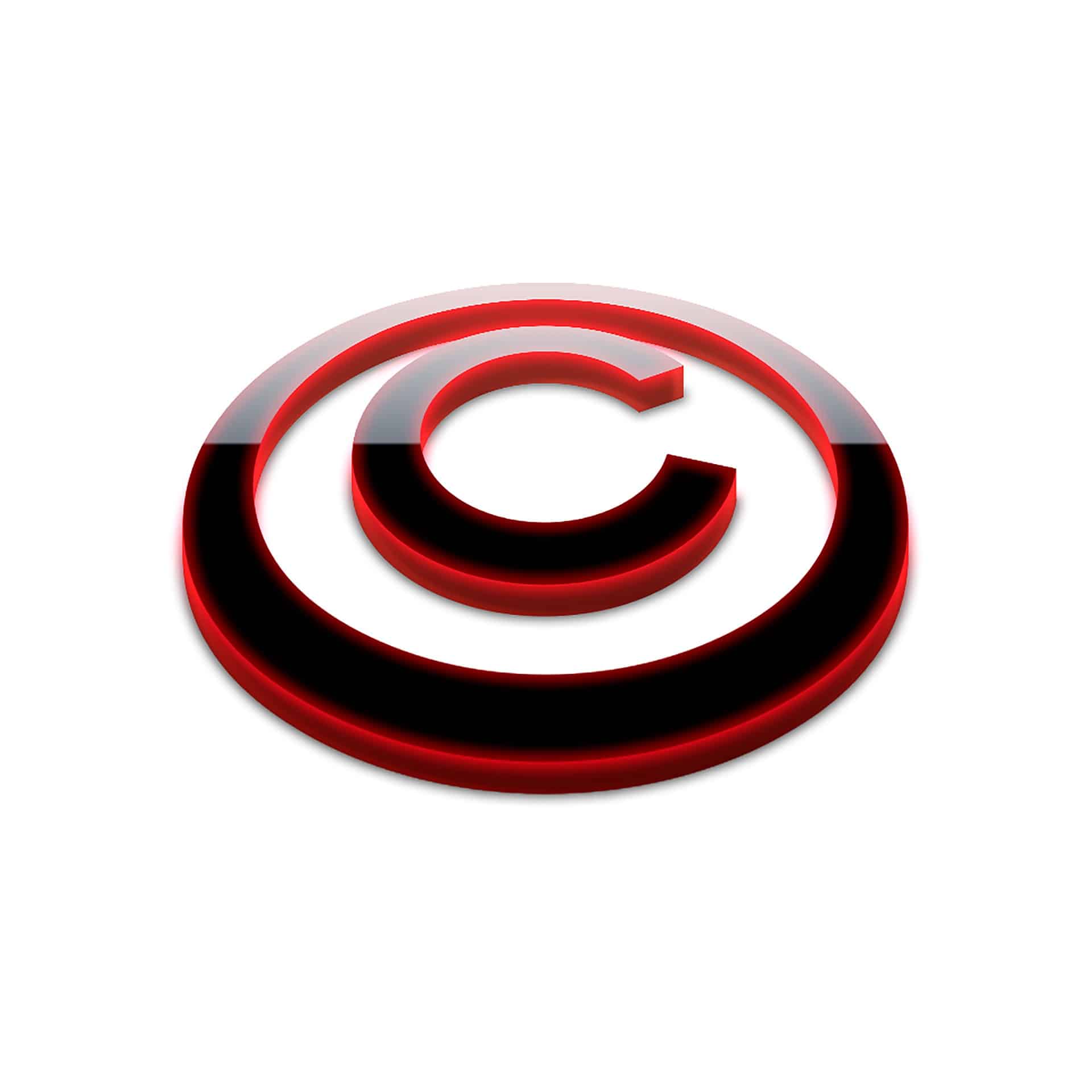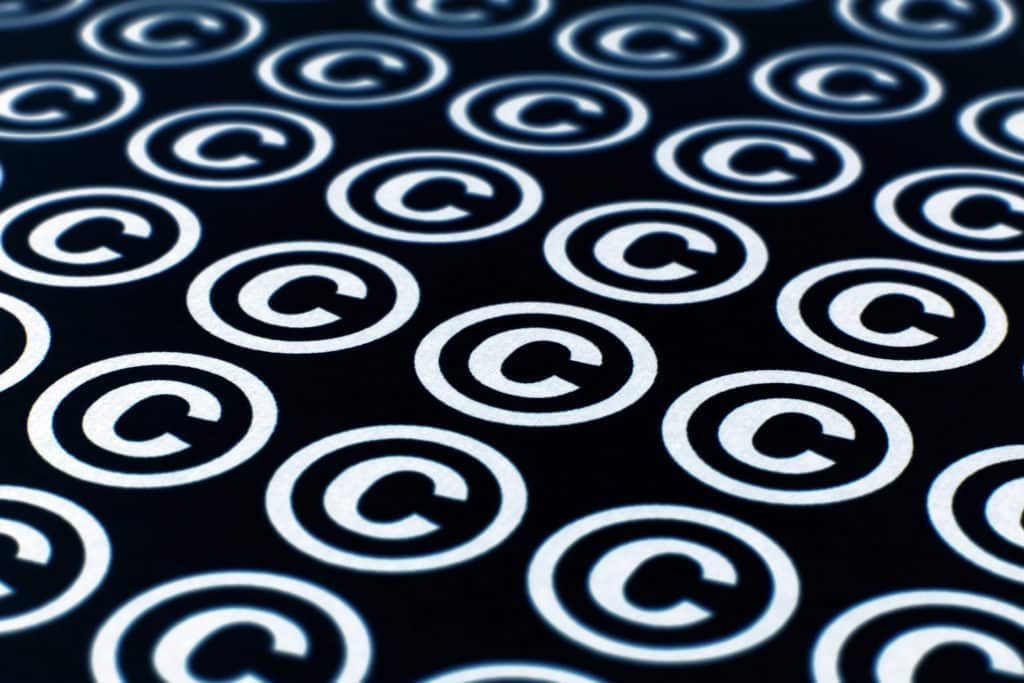What is a Copyright? ©
A Copyright is best described as a set of rights granted by the government for the expressions of ideas or information.
Quite literally, it is the set of rights the owner has to allow copies of the expression to be made.
In the United States, the following classifications of expressions of ideas are bound by copyright law:
(1) literary works;
(2) musical works, including any accompanying words;
(3) dramatic works, including any accompanying music;
(4) pantomimes and choreographic works;
(5) pictorial, graphic, and sculptural works;
(6) motion pictures and other audiovisual works;
(7) sound recordings; and
(8) architectural works.
In the United States, U.S. Code Title 17 controls copyright law.

How Long Does a Copyright Last?
The duration of a copyright can be measured by when a work was created.
Works created on or after January 1, 1978 are measured generally for 70 years after the life of the author. That means that the copyright expires 70 years after the author’s death. In the case of a joint work, the 70-year time period is measured after the last author’s death.
Works that are works for hire, the term is 95 years from the date of its first publication, or 120 years from the date the work was created.
Do I Need to File and Register a Copyright?
No – and yes.
Although that sounds like a silly answer, a Copyright does not need to be registered with the United States in order to exist.
A work is fixed as long as it is in a tangible medium.
Once a work is fixed, is it written; therefore, a copyright exists in the work.
However, please note, Copyright Act – Section 411(a) requires, in part:
[N]o civil action for infringement of the copyright of any United States work shall be instituted until preregistration or registration of the copyright claim has been made in accordance with this title.
A unanimous opinion in Fourth Estate Public Benefit Corp. v. Wall-Street.Com, LLC, authored by Justice Ruth Bader Ginsburg affirmed the validity of the requirement that, in order to start a copyright infringement lawsuit, the plaintiff must have all of the plaintiff’s copyrights registered with the Library of Congress.
What is an Author? What is a Joint Work?
An author is a person who contributes to a work.
A joint work is a work prepared by two or more authors with the intention that their contributions be merged into inseparable or interdependent parts of a unitary whole, according to U.S. Code 17, Section 101.
What is Fair Use?
A derivative work is a work that is based upon another work.
The owner of a copyright can block the use of a work in another, derivative work.
According to Fair Use, U.S. Code 17 Section 107 states that there are times when a copyright owner cannot stop that use.
These uses include criticism, comment (examples: satire or review), news reporting, teaching, scholarship, or research. There are several factors that are considered in determining if the original work was fairly used in the new work.
What is Copyright Infringement?
Copyright Infringement is defined by U.S. Code Title 17, Section 501.
Infringement occurs when any of the exclusive ownership rights as defined by Sections 106 and 122 are broken.
This does include the impermissible use of a copyrighted work, but there are many different types of rights enumerated.
What Damages May be Recovered in a Copyright Infringement Lawsuit?
There are, generally, four types of damages available in a copyright infringement lawsuit:
1) Actual Damages and Additional Profits
2) Statutory Damages
3) Extra damages for Willful Infringement
4) Attorney’s Fees and Costs
What are Actual Damages and Additional Profits in a Copyright Infringement Lawsuit?
According to the Copyright Act, the copyright holder is entitled “to recover the actual damages suffered by him or her as a result of the infringement, and any profits of the infringer that are attributable to the infringement and are not taken into account in computing the actual damages.” 17 U.S.C. § 504(b). For purposes of establishing the infringer’s profits, the copyright holder must “present proof of only the infringer’s gross revenue, and the infringer is required to prove his or her deductible expenses and the elements of profit attributable to factors other than the copyrighted work.” Id.
Thus, in an infringement action, the copyright owner can recover actual damages suffered in addition to any profits of the infringer that are attributable to the infringement (as long as these are not taken into account in computing the actual damages).
What are Statutory Damages in a Copyright Infringement Lawsuit?
A copyright holder may elect to recover statutory damages rather than actual damages and additional profits of the infringer according to Section (c) of the Copyright Act:
[T]he copyright owner may elect, at any time before final judgment is rendered, to recover, instead of actual damages and profits, an award of statutory damages for all infringements involved in the action, with respect to any one work, for which any one infringer is liable individually, or for which any two or more infringers are liable jointly and severally, in sum of not less than $750 or more than $30,000 as the court considers just. For the purposes of this subsection, all the parts of a compilation or derivative work constitute one work.
17 U.S.C. § 504(c). Statutory damages are awarded “per work” infringed—if 3 songs are infringed, the copyright owner would be able to recover a statutory damage per song. In that situation, the copyright holder would be able to recover a statutory damage of at least $750 per song, yielding a total minimum award of $2,250 or a maximum award of $90,000.
Only plaintiffs who have formally registered their work with the Copyright Office (within three months of creation or at least one month of discovery of the infringement) are allowed to seek or receive statutory damages. Most producers (unless they’re large companies or have created major works like records or major publications) usually don’t file the necessary paperwork.
Statutory damages are generally unavailable for infringement of unregistered works, except for infringement of a published work registered within three months of its first publication. See 17 U.S.C. § 412.
What damages exist for Willful Infringement of a Copyright?
In some cases, a copyright holder can recover more damages where the infringement was willful. “In a case where the copyright owner sustains the burden of proving, and the court finds, that infringement was committed willfully, the court in its discretion may increase the award of statutory damages to a sum of not more than$150,000.” 17 U.S.C. § 504.
In a case where the infringer sustains the burden of proving, and the court finds, that such infringer was not aware and had no reason to believe that his or her acts constituted an infringement of copyright, the court in its discretion may reduce the award of statutory damages to a sum of not less than $200.
Can a Plaintiff win Attorney’s Fees in a Copyright Infringement Lawsuit?
A court may award costs to the prevailing party, which may include reasonable attorneys’ fees. See 17 U.S.C. § 505. However, attorneys’ fees are generally unavailable for infringement of unregistered works, except for infringement of a published work registered within three months of its first publication. See 17 U.S.C. § 412.

